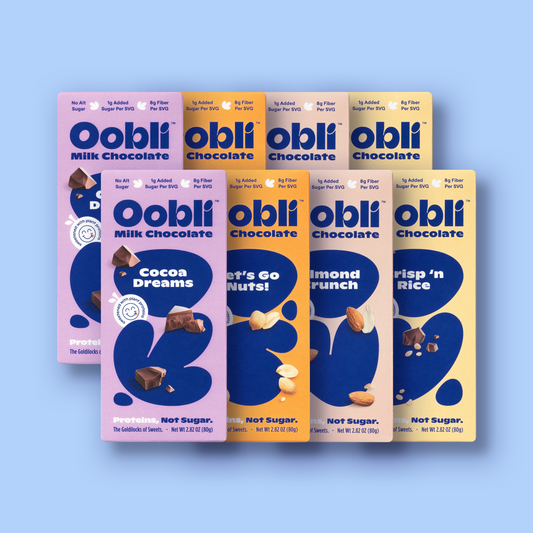Sugar-free and low-calorie alternatives are becoming increasingly popular in today’s health-conscious world, but at what cost to our well-being? Many of these products contain artificial sweeteners, which often come with harmful short and long-term side effects.
One popular sweetener, aspartame, is known for causing headaches. The throbbing, ear-splitting effects of aspartame can make it difficult to go about your day, and relief can be hard to come by.
In this guide, we’ll explain everything you need to know about headaches from aspartame. We’ll discuss the aspartame headache symptoms, why you get a headache from aspartame, and how to get rid of aspartame headaches.
We’ll also give you some tips on preventing aspartame headaches, and introduce you to a safer, healthier low-calorie sweetener that won’t leave your head throbbing!
Can Aspartame Give Me a Headache?
First of all, can aspartame give you a headache? In short, yes. Research dating back as far as the 1980s has linked aspartame with headaches in some people, and we’ve learned a lot more about getting a headache from aspartame since then.
Aspartame Headache Symptoms
Aspartame headaches are characterized by specific symptoms that set them apart from other types of headaches. They typically cause a pulsating or throbbing pain, which can be mild or severe. This pain may be on one or both sides of the head and is usually felt in the frontal or temporal areas.
A headache from aspartame often occurs shortly after consuming products containing aspartame and may persist for several hours or even days, depending on your individual sensitivity to aspartame.
As well as a headache from aspartame, some people may experience additional symptoms such as nausea, dizziness, and sensitivity to light and sound, which are reminiscent of migraine headaches.
Individual Sensitivity and Variability
So, can aspartame give you a headache? Yes, but not everyone experiences headaches from aspartame. Some people are more sensitive to this sweetener than others, for a number of reasons.
Genetic factors play a role in determining your sensitivity to aspartame. Some people may be more genetically predisposed to experiencing headaches from aspartame than others.
The amount of aspartame consumed can also affect whether or not a headache occurs. Some people can tolerate small amounts without issue but experience headaches when exposed to higher doses of the sweetener.
Certain underlying health conditions, such as migraines, may make you more susceptible to aspartame-induced headaches. If you have a history of migraines, or regularly experience headaches, there’s a higher chance you’ll be sensitive to aspartame and it will trigger your headaches.
Why Does Aspartame Give Me a Headache?
We’ve already explained that there’s a link between aspartame and headaches, but why does aspartame give me a headache, exactly? Let’s explore the science behind aspartame headache symptoms.
Disruption of Neurotransmitter Balance
After we consume aspartame, it’s broken down into its constituent amino acids (phenylalanine and aspartic acid) and methanol. Phenylalanine, in particular, has been linked to changes in neurotransmitter levels, such as serotonin and dopamine.
These neurotransmitters play a crucial role in regulating mood and pain perception. Any alterations in their balance, which is what aspartame causes, can potentially lead to headaches.
Excitotoxicity
Excitotoxicity is a process that occurs when excessive stimulation of nerve cells by neurotransmitters, particularly glutamate, damages our nerve cells.
Aspartame contains aspartic acid, which can be metabolized to glutamate, a neurotransmitter that can trigger excitotoxicity when present in high levels. When aspartame triggers excitotoxicity, it may lead to headaches, particularly in people sensitive to glutamate.
Aspartame and Blood Vessel Changes
Aspartame's potential to affect blood vessels is another theory that could explain how it causes headaches. Phenylalanine, which is found in aspartame, can affect the diameter of blood vessels by causing them to constrict or dilate under different circumstances.
Changes in blood vessel tone and function can cause headaches, and phenylalanine’s effects may lead to changes in blood flow to the brain, triggering a headache.
Sensitivity and Allergic Reactions
As we mentioned, some people are more sensitive to aspartame than others. You may have a heightened sensitivity to certain compounds in aspartame, or could even be allergic to them, leading to headaches, aspartame inflammation, and possibly other aspartame neurological effects.
How to Get Rid of Aspartame Headache
Let’s face it, trying to struggle through your day while dealing with a headache is no fun at all. If you’re wondering how to get rid of aspartame headaches, here are some tips for aspartame headache relief.
Hydration: The First Step in Counteracting Headaches From Aspartame
Dehydration is a common trigger for headaches of various types, and aspartame-induced headaches are no exception. To counteract the effects of aspartame, make sure you are adequately hydrated.
Drinking water is the best way to stay hydrated, but if you opt for sports drinks or other beverages, make sure you’re sticking to aspartame free drinks. Proper hydration can help dilute the concentration of aspartame in your system and reduce the intensity of your headache.
Natural Pain Relief Options: Magnesium and Riboflavin
Natural supplements like magnesium and riboflavin (vitamin B2) have shown promise in reducing the frequency and severity of headaches, including aspartame-induced headaches.
Consider adding foods rich in these nutrients to your diet, like avocados, nuts, seeds, whole grains, fatty fish, yogurt, cheese, and eggs. You can also talk to your doctor about adding magnesium or riboflavin supplements to your diet.
Caffeine: A Double-Edged Sword in Headache Management
Caffeine, when used carefully, can provide relief for some headache sufferers, as it can help constrict blood vessels and reduce headache pain. However, it's essential to be cautious with caffeine, as too much can lead to caffeine withdrawal headaches.
Relaxation Techniques: Yoga and Deep Breathing for Symptom Reduction
Stress and tension can make headaches worse, so relaxation techniques can be an effective way to manage your headache symptoms. Yoga, meditation, and deep breathing exercises can help reduce stress and alleviate headache symptoms.
Try to regularly incorporate these relaxation techniques into your routine to improve your overall health and reduce the likelihood of headaches from aspartame and other causes.
Over-the-Counter Solutions: Safe Use of Analgesics in Finding Relief for Headaches From Aspartame
If you’ve already tried everything we’ve discussed and your headache symptoms just won’t budge, over-the-counter pain relievers can usually provide relief. Non-prescription medications such as ibuprofen or acetaminophen can help reduce headache pain.
Just make sure you follow the recommended dosages carefully, and talk to your doctor if even medications can’t relieve your headache symptoms.
Tips on Preventing Headache From Aspartame in the Future
So, can aspartame give you a headache? Yes, but luckily, there are a few things you can do to prevent aspartame from causing headaches in the future. Here are a few tips for cutting aspartame-induced headaches out of your life for good.
Reading Labels: Avoiding Aspartame in Everyday Products
The first and most important step in preventing aspartame-induced headaches is to be vigilant about reading product labels. Aspartame can be found in a wide range of everyday products, including diet sodas, sugar-free gum, low-calorie snacks, and even some medications.
Make a habit of checking ingredient lists on food labels to identify products that contain aspartame. By doing so, you can do an aspartame detox and save yourself the stress and pain of aspartame-induced headaches.
Natural Sweetener Swaps: Stevia and Monkfruit as Alternatives
To satisfy your sweet tooth without the potential headache trigger, consider switching to natural sweeteners like stevia and monkfruit. These sweeteners are derived from plants and have gained popularity as low-calorie, sugar-free alternatives to aspartame.
When it comes to stevia vs aspartame, stevia is generally well-tolerated and not associated with the same side effects as aspartame. However, there’s one problem: stevia tastes bad. It has a bitter, metallic aftertaste that most people find deeply unpleasant.
Also, make sure you understand the risks of consuming stevia while pregnant, and the stevia weight gain links. If you’re planning on using stevia to lose weight, you might be surprised that it could lead to disappointing results.
Similarly, if you’re planning on replacing aspartame with sucralose, make sure you understand the symptoms of sucralose intolerance, the effects of sucralose on keto diets, and the links between sucralose and migraines.
Monkfruit is a natural sweetener that most people tolerate well. However, sometimes it’s combined with erythritol, a sugar alcohol, which means you need to be aware of the erythritol side effects, or look for monkfruit products that use erythritol substitutes.
Another safe, low-sugar option is sweet proteins, which are naturally found in tropical fruit and can be up to 5,000 times sweeter than regular table sugar. The benefits of sweet proteins are that they don’t change the flavor of your food, and they don’t come with nasty side effects.
Using sweet proteins as a sugar substitute is becoming more popular, as they can be produced in large quantities with a precision fermentation protein process, similar to how beer, wine, and cheese are made.
Whole Foods Approach: Dietary Changes to Minimize Processed Ingredients
Another effective strategy to reduce your exposure to aspartame is to shift towards a whole foods approach to your diet. Whole foods, such as fruits, vegetables, lean proteins, and grains, are generally free of artificial sweeteners.
By minimizing your consumption of processed and pre-packaged foods, you can significantly lower your intake of aspartame. This approach not only aids in preventing headaches but also promotes a healthier, more balanced diet.
Final Thoughts on Aspartame Headache Relief
So, why does aspartame give me a headache? Aspartame can cause headaches by disrupting our delicate balance of neurotransmitters, affecting the blood vessels that supply our heads, or causing excitotoxicity.
Luckily, it’s not all bad news! Avoiding products with aspartame is the easiest way to prevent headaches caused by this sweetener, and there are a lot of different options out there for you to choose from.
At Oobli, we use natural sweet proteins to create the best sugar free drinks, free from the aspartame-induced headache and other side effects of artificial sweeteners. Our low sugar tea is refreshingly quenching, available in a great range of fruity flavors, and completely guilt-free!
As well as our revolutionary sweet iced teas, we also have incredible low-sugar chocolate bars. They’re keto-friendly, vegan, high in fiber, and contain just a handful of natural ingredients - nothing nasty or artificial. Most importantly, they taste amazing!
Leave aspartame-induced headaches in the dust - switch to healthy, safe, naturally sweetened snacks with Oobli!




